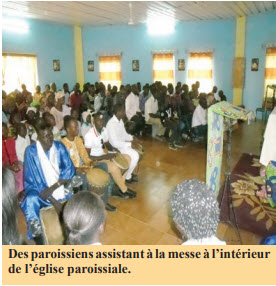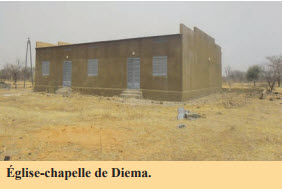Projet 46 - A wall for DIEMA
In our western countries, we delimit the land on which our house is built, by planting a cedar hedge, for example. In Mali, in West Africa, this habit has always existed: a brick wall is built. This is what Father Alick Mwamba proposes for the Church of Diema.
The life of my parish

My parish is located in the town of Nioro du Sahel, in Mali, one of the countries of West Africa. It is northwest of Payas and is located 450 km from the capital Bamako. There are about 330,000 inhabitants. We have two seasons: the rainy season from July to September and the dry season from October to June. During the dry season, the desert wind, the harmattan, dries up the vegetation and the temperature often reaches 46°C in the shade.
Almost all economic activity is centered around livestock. The herd consists of oxen, sheep, goats, donkeys and horses. During the three months of rain, people practice a little agriculture: millet, sorghum, corn and groundnut. Despite this, every year there is a food crisis.
Our Diocese
You probably know that our mission is really at the heart of Islam. In Mali 99% of the population is Muslim. Christians account for barely 1% of the population. Our bishop, Bishop Jonas Dembele, is the pastor of an immense diocese named Kayes. What is important to know is that this diocese was erected on July 31, 1963. It has an area of 120,760 km2 and has about 1, 311,000 inhabitants of which about 7,000 are baptized. There are only 7 parishes in this diocese, with 15 priests and 18 nuns. The parish of Our Lady of Fatima in Nioro of the Sahel was founded in 1960 by the Missionaries of Africa. It is the only parish which the Missionaries of Africa hold in this diocese.
To explain the extent of our parish, I give you the names of the 4 towns that it consists of: Nioro du Sahel, Diema, Lattakaf and Nara. The main church is at Nioro du Sahel. We have a church in Diema which is located 100 km. We have two more: one in Lattakaf at 165 km and another at Nara at 425 km. Diema, built in 1990, is the closest. There are about 60 Catholics. Every Sunday there are at least 40 people for Mass.
In this environment, the mission of the Church is to solidify the faith of Christians. In addition, our mission fits into education through literacy and the library. We believe in the meeting, dialogue and integral development of Malians, regardless of religion.
The Church of Diema

2011, we were able to acquire one hectare of land. Then we built a chapel and a house for the catechist. Currently, we want to secure the church yard by building a fence around it: it's really important!
- Shepherds, regularly feed cows, sheep, goats and donkeys in the courtyard of the church to graze our shrubs and the leaves of our trees;
- Several people throw their garbage at the edge of the church yard;
- The city is growing and there are people coming to build around the church. If there is no wall to delimit our land, it is easy for them to take possession of the land;
- Stray dogs often attack, kill and eat poultry and catechist animals; they have had to leave to find accommodation in the city center.
Our Christian community
Since last year, our Christians have been contributing to solving this problem on the ground. Today, the sum amounts to 110,000 FCFA, or 240.00 $ It is minimal and almost insignificant compared to the work to be done, but it is a small community composed of 16 families. Some do not have the financial means to have three meals a day. Similarly, parents can not send their children to good schools. I believe that their efforts to have a protective wall is more than commendable.
Our project, which is encouraged by the missionaries of Canada, is magnificent and testifies to the strength of the Holy Spirit in Mali. The total cost is 14, 736,000 FCFA, or $ 33,000.00
We suggest you help us to finalize this project which is of great importance for our Christian community. Our Christians know that I have written to you, telling them of your generosity and your great spirit of mutual help. They include you in their Sunday prayers during the lively and lively Mass. Our Christians and we, Missionaries of Africa, thank you for the attention that you will give to this project, probably a little special for you. Please find our deepest gratitude.
Father Alick Mwamba,
